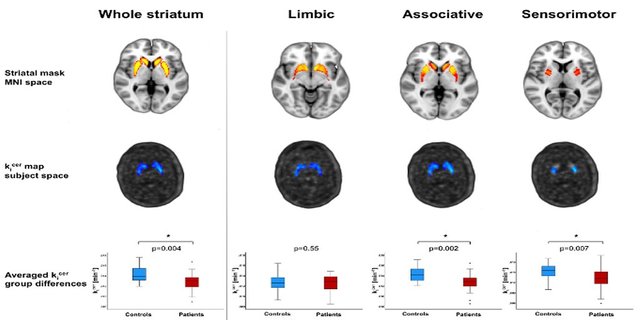What if current treatments for mental illnesses like Schizophrenia are flawed?
A new peer-reviewed paper, that may raise questions as to the correct treatment options, has been published: Reduced striatal dopamine synthesis capacity in patients with schizophrenia during remission of positive symptoms .
Schizophrenia is a severe form of mental illness affecting approximately 24 million people worldwide [WHO].
Clinical management of schizophrenia is possible using a range of different antipsychotics, although treatment is associated with a variety of treatment-related adverse events. Patients with schizophrenia and related disorders experience a markedly shorter life expectancy than the general population.
Moreover, a systematic literature review of cost-of-illness studies for schizophrenia in Germany, found that schizophrenia causes societal cost of several billion Euros per year.
We can see that this disease has both a HIGH human and societal cost. Therefore, getting treatment options right is paramount.
Schizophrenia is a serious mental disorder characterized by three categories of symptoms:
Positive (Psychotic)
Characterized by hallucinations and delusions, very characteristic of Schizophrenia
Negative
Characterized by blunted emotions, loss of enjoyment in activities
Cognitive Impairment
Characterized by abnormalities of attention, organization or planning abilities
Therefore, the disease can produce very complex patterns of symptoms, spanning many different kinds of mental functions: from cognitive abnormalities to more emotional and motivational impairments (negative symptoms) to perceptual abnormalities (positive symptoms).
The causes of this disease are not yet fully understood, but there are several contributing factors including: genetic vulnerability, stress, malnutrition, psychosocial factors and problems during pregnancy or at birth.
The Dopamine Hypothesis of Schizophrenia
One important hypothesis, developed in the 60s and 70s, but still prominent today, is the dopamine hypothesis of Schizophrenia. It suggests that positive symptoms in Schizophrenia involve an excess of dopamine activity (dopaminergic overstimulation and/or increased levels of dopamine).
However, an important limitation of this hypothesis is that it does not fully explain cognitive or negative deficits. Although, beyond schizophrenia, dopamine has been linked to cognition, learning and decision-making. The evidence indicates a link between proper dopamine levels and optimal cognitive functioning in healthy subjects.
Nevertheless, the hypothesis is crucial for understanding how to treat positive symptoms. What evidence is there to support this hypothesis?
Evidence in support of the hypothesis
First, it was found that hard drugs (like cocaine and amphetamines) carry a high risk of inducing psychosis. These drugs increase synaptic dopamine availability.
Secondly, antipsychotic drugs that block dopamine appear to be effective in treating the positive symptoms of schizophrenia.
Furthermore, medical imaging techniques, such as PET scans, identified the area in which dopaminergic overstimulation happens - the striatum.
New Findings and Conclusion
A link was established between increased dopamine synthesis capacity at the level of the striatum and positive symptoms in patients. Crucially, this link has also been established in psychosis caused by other disorders, like bipolar disorder and epilepsy.
Moreover, an important recent finding is that high levels of dopamine in the striatum are not constant throughout the disorder - but fluctuate over time.
Avram et al. show that striatal dopamine synthesis capacity is reduced in patients with schizophrenia during remission of positive symptoms. Striatal dopamine dysfunction may contribute to cognitive impairments in the disorder. The main author, Dr. Mihai Avram, says that:
Recent evidence suggests that elevated levels of dopamine synthesis capacity might be a byproduct of psychosis, since remitted patients on psychosis present rather reduced than elevated levels. Therefore, elevated dopamine levels may reflect a state- and not a trait-marker of schizophrenia as previously thought.
Feel free to retweet the original source on Twitter.
In conclusion, while Schizophrenia is a very complex disease, our understanding of it is constantly improving, and while the dopamine hypothesis of schizophrenia seems to be accurate during the psychotic phases of the disorder, it does not accurately account for distinct courses of the disorder (e.g. psychotic remission), and needs therefore to be updated....

Congratulations @avrdan! You received a personal award!
You can view your badges on your Steem Board and compare to others on the Steem Ranking
Vote for @Steemitboard as a witness to get one more award and increased upvotes!
Downvoting a post can decrease pending rewards and make it less visible. Common reasons:
Submit